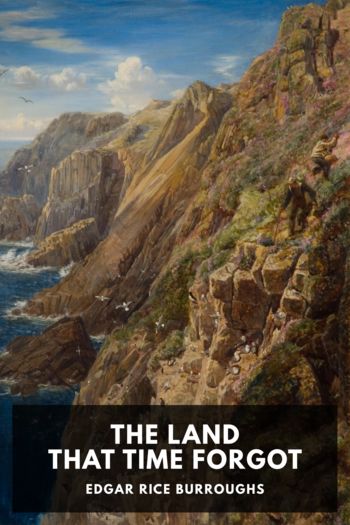South!, Ernest Shackleton [good books to read in english TXT] 📗

- Author: Ernest Shackleton
Book online «South!, Ernest Shackleton [good books to read in english TXT] 📗». Author Ernest Shackleton
On May 10, the first day possible, the three men left behind walked over new ice to the north to try and discover some trace as to the fate of the others. The footmarks were seen clearly enough raised up on the ice, and the track was followed for about two miles in a direction leading to Cape Evans. Here they ended abruptly, and in the dim light a wide stretch of water, very lightly covered with ice, was seen as far as the eye could reach. It was at once evident that part of the ice over which they had travelled had gone out to sea.
The whole party had intended, if the weather had held good, to have attempted the passage across with the full moon about May 16. On the date on which Mackintosh and Hayward left it was impossible that a sledge should travel the distance over the sea-ice owing to the sticky nature of the surface. Hence their decision to go alone and leave the others to follow with the sledge and equipment when the surface should improve. That they had actually been lost was learned only on July 15, on which date the party from Hut Point arrived at Cape Evans.
The entry in Joyce’s diary shows that he had very strong forebodings of disaster when Mackintosh and Hayward left. He warned them not to go, as the ice was still thin and the weather was uncertain. Mackintosh seems to have believed that he and Hayward, travelling light, could get across to Cape Evans quickly before the weather broke, and if the blizzard had come two or three hours later they probably would have been safe. The two men carried no sleeping-bags and only a small meal of chocolate and seal meat.
The weather during June was persistently bad. No move had been possible on May 16, the sea-ice being out, and Joyce decided to wait until the next full moon. When this came the weather was boisterous, and so it was not until the full moon of July that the journey to Cape Evans was made. During June and July seals got very scarce, and the supply of blubber ran short.
Meals consisted of little but seal meat and porridge. The small stock of salt was exhausted, but the men procured two and a half pounds by boiling down snow taken from the bottom layer next to the sea-ice. The dogs recovered condition rapidly and did some hunting on their own account among the seals.
The party started for Cape Evans on July 15. They had expected to take advantage of the full moon, but by a strange chance they had chosen the period of an eclipse, and the moon was shadowed most of the time they were crossing the sea-ice. The ice was firm, and the three men reached Cape Evans without difficulty. They found Stevens, Cope, Gaze, and Jack at the Cape Evans Hut, and learned that nothing had been seen of Captain Mackintosh and Hayward. The conclusion that these men had perished was accepted reluctantly. The party at the base consisted now of Stevens, Cope, Joyce, Richards, Gaze, Wild, and Jack.
The men settled down now to wait for relief. When opportunity offered Joyce led search-parties to look for the bodies or any trace of the missing men, and he subsequently handed me the following report:
“I beg to report that the following steps were taken to try and discover the bodies of Captain Mackintosh and Mr. Hayward. After our party’s return to the hut at Cape Evans, July 15, 1916, it was learned that Captain Mackintosh and Mr. Hayward had not arrived; and, being aware of the conditions under which they were last seen, all the members of the wintering party were absolutely convinced that these two men were totally lost and dead—that they could not have lived for more than a few hours at the outside in the blizzard that they had encountered, they being entirely unprovided with equipment of any sort.
“There was the barest chance that after the return of the sun some trace of their bodies might be found, so during the spring—that is, August and September 1916—and in the summer—December and January 1916–17—the following searches were carried out:
“(1) Wild and I thoroughly searched Inaccessible Island at the end of August 1916.
“(2) Various parties in September searched along the shore to the vicinity of Turk’s Head.
“(3) In company with Messrs. Wild and Gaze I started from Hut Point, December 31, 1916, at 8 a.m., and a course was steered inshore as close as possible to the cliffs in order to search for any possible means of ascent. At a distance of half a mile from Hut Point we passed a snow slope which I had already ascended in June 1916; three and a half miles farther on was another snow slope, which ended in Blue Ice Glacier slope, which we found impossible to climb, snow slope being formed by heavy winter snowfall. These were the only two places accessible. Distance on this day, 10 miles 1710 yds covered. On January 1 search was continued round the south side of Glacier Tongue from the base towards the seaward end. There was much heavy pressure; it was impossible to reach the summit owing to the wide crack. Distance covered 4 miles 100 yds. On January 2 thick weather caused party to lay up. On 3rd, glacier was further examined, and several slopes formed by snow led to top of glacier, but crevasses between slope and the tongue prevented crossing. The party then proceeded round the Tongue to Tent





Comments (0)